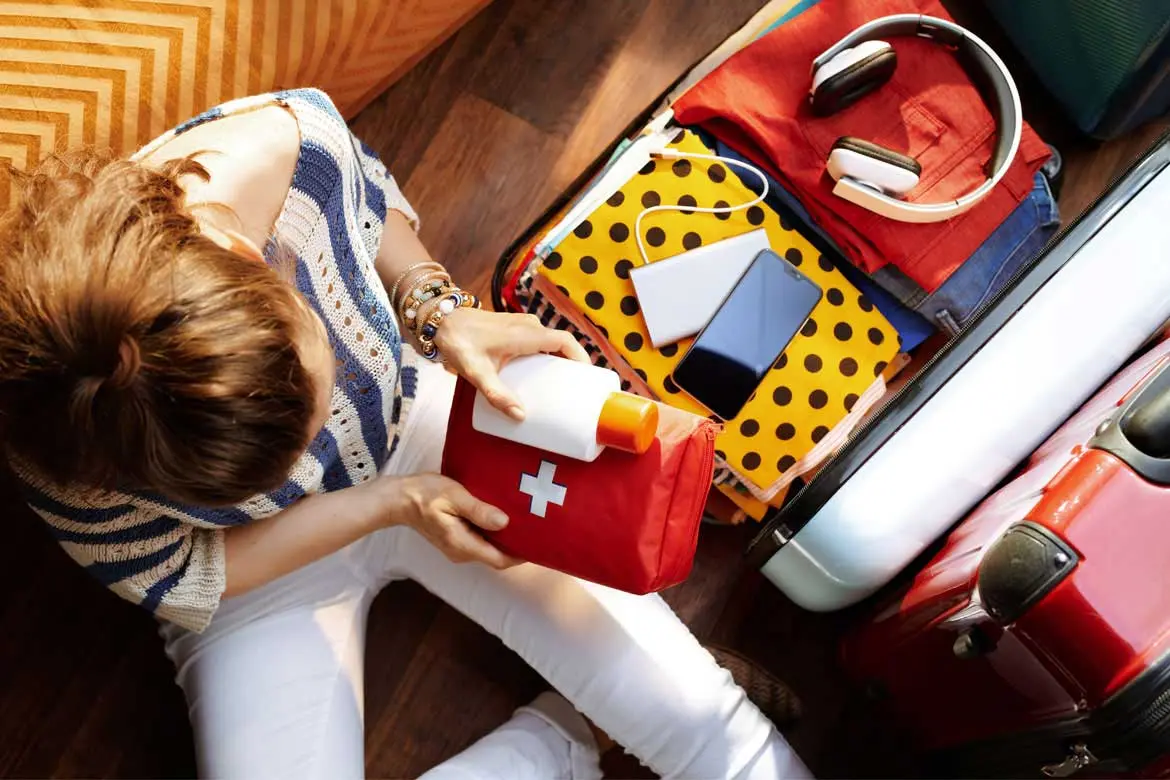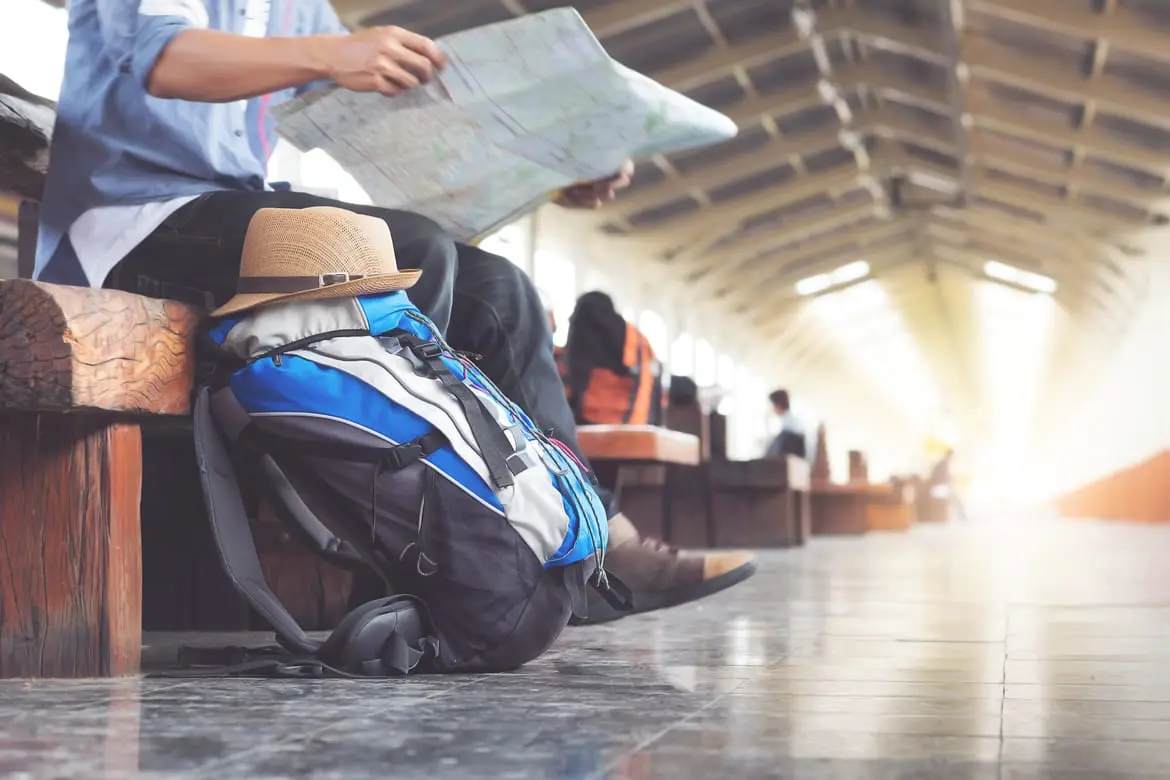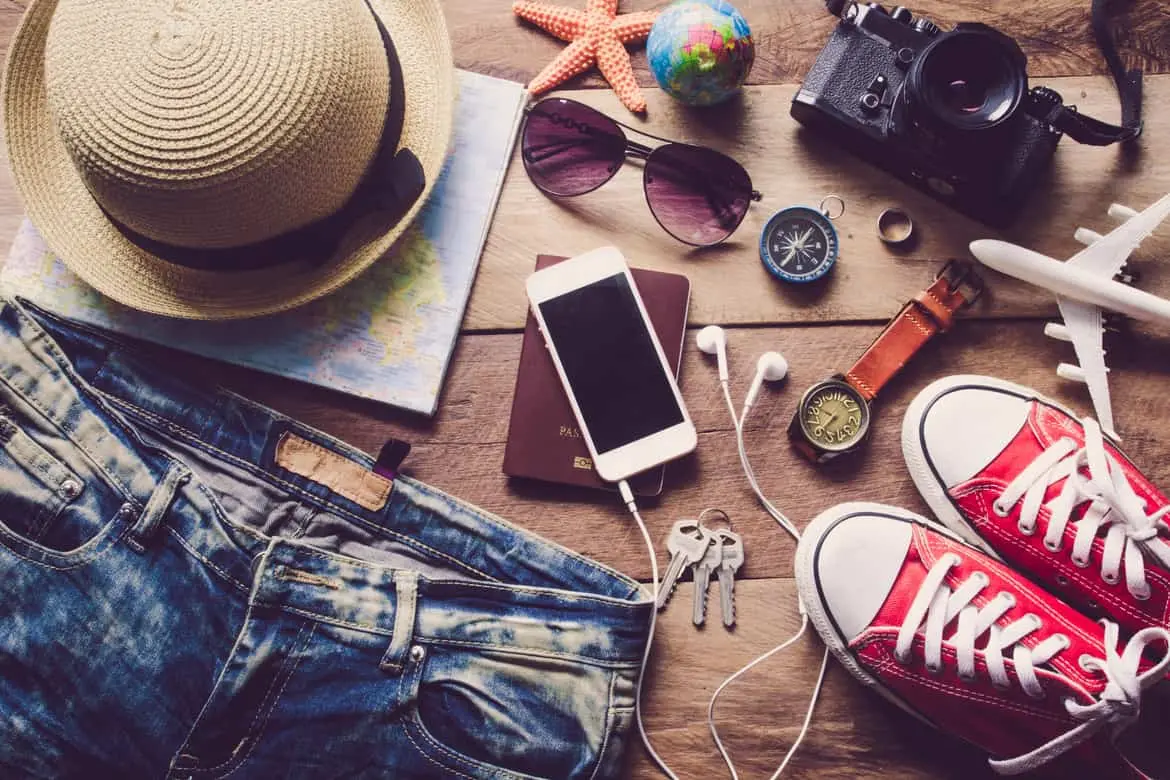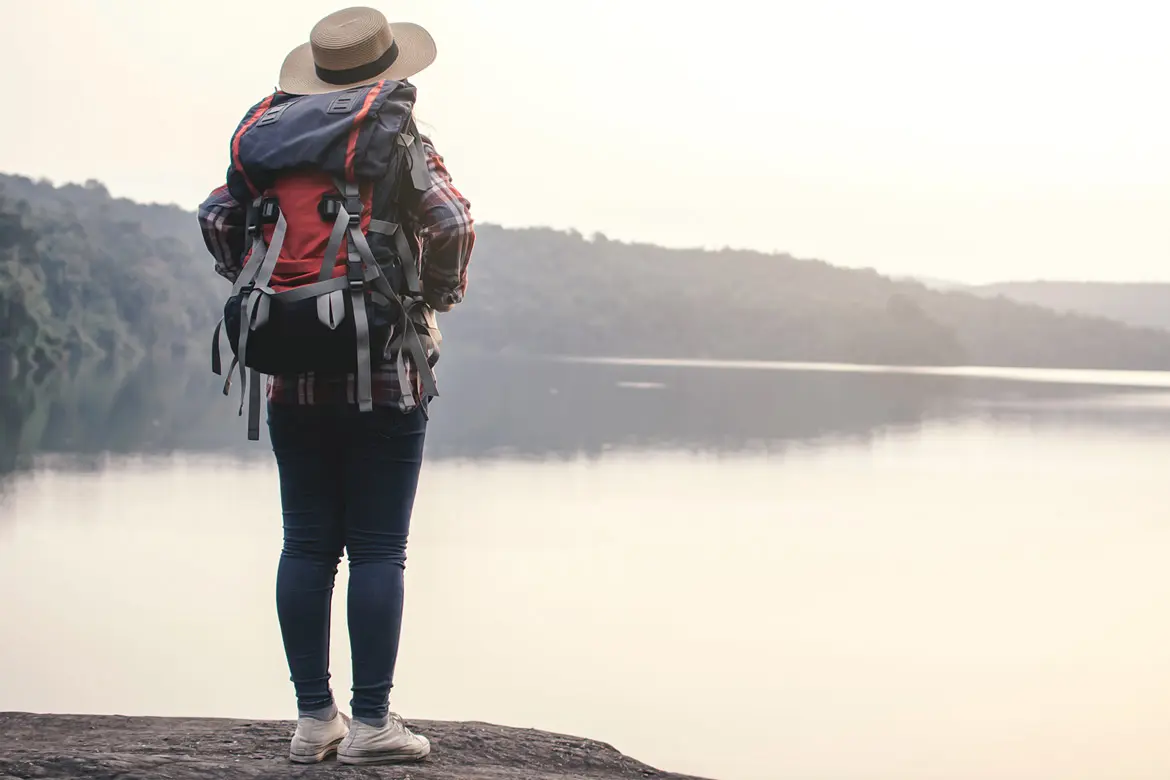

Source: Shutterstock
The Ultimate Packing List for Health-conscious Travellers
Last updated: Tuesday, January 14, 2020 | 4 min reading time
First Aid Items and Supplies
No adventure or travel is without risks, which is why you should cobble together a DIY first aid kit for minor accidents. Should these basic items be insufficient, seek professional medical help as soon as possible.
Antiseptics and Antibiotics
When the clumsier side of you requires treatment for a scraped knee or minor cut, use an antibiotic like Neosporin or antiseptic wash such as Dettol to prevent possible infection. After that, use an iodine spray to disinfect the wound.
Band-aids and Bandages
Get waterproof versions for both, so that showering after sustaining an injury is not a hindrance.
Eyedrops
Lubricant eyedrops provide relief for sore or irritated eyes caused by long flights, little sleep, or dust particles in the air. Be sure to buy the right eyedrops, especially if you're wearing contact lenses.
Sunscreen
Essential for beach vacations and if you're travelling beneath the hot sun. Be sure to pack a water-resistant, broad spectrum sunscreen with a minimum SPF level of 30.
Essential Medicine
Seeking medical attention in an unfamiliar country can be daunting due to a lack of knowledge or language barrier. Make sure to pack some over-the-counter medicine, so that you can self-medicate should the need arise. When in doubt, check in with your doctor, or pharmacist.
Anti-diarrhoeal medication
Love street food? Prevent food poisoning by packing some medication along, just in case you're struck with travellers' diarrhoea. It's a common condition that can be easily solved by over-the-counter medication such as a charcoal preparation, diphenoxylate or loperamide, rest and hydration.
Antihistamines
Don't let allergies ruin your holiday. Packing antihistamines such as Benadryl or Claritin will prevent sneezing fits or teary eyes from ruining a day out exploring. Be mindful that Benadryl may cause drowsiness.
Electrolyte Sachets
Electrolyte sachets can help replenish lost fluids and salts, and are particularly useful for adventure seekers and those looking to enjoy the great outdoors.
Mild laxatives/probiotics
On the flip side, you may be afflicted by constipation due to sudden changes in your diet and routine. Mild laxatives such as Dulcolax and probiotics can help to improve your digestive system.
Motion Sickness Pills
From planes to boats, trains, and buses – travellers can spend long hours in transit or hopping on various modes of transport. Motion sickness pills such as Dramamine can prevent nausea or headaches.
Pain relief
Take a tray of Tylenol or Paracetamol with you for body aches, headaches or mild fevers. If you're facing physical pain – such as cramps or ankle aches – bring Ibuprofen along instead. Be careful to stick to the recommended dosage!
Weather-appropriate clothing
Hot summers or tropical climates
Dress light to feel as cool as possible. It's time to whip out that summer dress and sweat-wicking t-shirt for comfort. A pair of sunglasses will protect your eyes – and amp up your swag to boot – while a hat can provide you some reprieve from the sun's rays.
Cold winters and damp climates
To stay toasty in temperate countries, consider packing in layers of clothes so you can adapt to changes in the weather. Never underestimate the usefulness of a beanie and scarf to keep your upper body warm.
Invest in a few different coats for slight changes in temperatures. Thick socks and boots with non-slip soles are also a must for wandering in the great outdoors.
Other Useful Products
Face masks
A face mask is great for replenishing moisture to retain your skin's original condition, making it a great packing option for arid climes. If you're not the self-conscious type, you can even wear it onboard airplanes to combat dry cabin air!
Moisturisers
Besides face masks, moisturisers or balms should be used before you sleep, and when you start your day. This is especially so in cold climates, where the air can dry out your skin.
Travel Prep – Vaccinations and Travel Insurance
Packing aside, it may be useful to do some prep before your trip.
Before travelling, do some research on potential hazards or disease hotspots; vaccinations can protect travellers from serious diseases such as polio, yellow fever or malaria. Remember to get your jab four to six weeks before travelling. You might also consider taking anti-malarial prophylaxis while travelling to the malarial endemic regions – speak to your doctor about this.
Ending up in a hospital overseas could potentially be very expensive, so be sure to compare travel insurance promotions that adequately cover this potential issue. Remember to check and compare the duration that the insurance covers upon your return home.
Should you feel unwell upon returning from a holiday, call Gleneagles Hospital's 24-hour UCC helpline at +65 6470 5688 or visit Gleneagles Hospital's 24-hour Urgent Care Centre (UCC) at 6A Napier Road.
Centre for Disease Control and Prevention (n.d.). Pack smart. Retrieved on 28 October from https://wwwnc.cdc.gov/travel/page/pack-smart
Klerk, Amy (2019, Jan 15). How to not let the cold winter weather affect your style. Retrieved on 28 October 2019 from https://www.harpersbazaar.com/uk/fashion/street-style/news/a39267/tips-for-dressing-well-in-winter/
Rossi, Ashley (2019, Sep 6). 9 over-the-counter medicines you should pack for every trip. Retrieved on 28 October 2019 from https://www.smartertravel.com/over-the-counter-medicine-to-always-travel-with/
Singapore General Hospital. Travel Clinic. Retrieved on 28 October 2019 from https://www.sgh.com.sg/patient-care/specialties-services/Travel-Clinic
Scott, Emily (n.d.). 10 over-the-counter medications you should always carry abroad. Retrieved on 28 October 2019 from https://matadornetwork.com/read/otc-medications-carry-abroad/
Vaccines for Travelers. Retrieved on 28 October 2019 from https://www.vaccines.gov/who_and_when/travel
The Straits Times (2016, Nov 27) 10 Tips on Buying Travel Insurance. Retrieved on 28 October from https://www.straitstimes.com/business/invest/10-tips-on-buying-travel-plans
Klerk, Amy (2019, Jan 15). How to not let the cold winter weather affect your style. Retrieved on 28 October 2019 from https://www.harpersbazaar.com/uk/fashion/street-style/news/a39267/tips-for-dressing-well-in-winter/
Rossi, Ashley (2019, Sep 6). 9 over-the-counter medicines you should pack for every trip. Retrieved on 28 October 2019 from https://www.smartertravel.com/over-the-counter-medicine-to-always-travel-with/
Singapore General Hospital. Travel Clinic. Retrieved on 28 October 2019 from https://www.sgh.com.sg/patient-care/specialties-services/Travel-Clinic
Scott, Emily (n.d.). 10 over-the-counter medications you should always carry abroad. Retrieved on 28 October 2019 from https://matadornetwork.com/read/otc-medications-carry-abroad/
Vaccines for Travelers. Retrieved on 28 October 2019 from https://www.vaccines.gov/who_and_when/travel
The Straits Times (2016, Nov 27) 10 Tips on Buying Travel Insurance. Retrieved on 28 October from https://www.straitstimes.com/business/invest/10-tips-on-buying-travel-plans
 Brain & Spine Care
Brain & Spine Care








